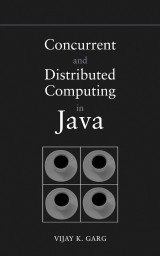Details

Concurrent and Distributed Computing in Java
IEEE Press 1. Aufl.
|
147,99 € |
|
| Verlag: | Wiley |
| Format: | |
| Veröffentl.: | 28.01.2005 |
| ISBN/EAN: | 9780471721260 |
| Sprache: | englisch |
| Anzahl Seiten: | 336 |
DRM-geschütztes eBook, Sie benötigen z.B. Adobe Digital Editions und eine Adobe ID zum Lesen.
Beschreibungen
Concurrent and Distributed Computing in Java addresses fundamental concepts in concurrent computing with Java examples. The book consists of two parts. The first part deals with techniques for programming in shared-memory based systems. The book covers concepts in Java such as threads, synchronized methods, waits, and notify to expose students to basic concepts for multi-threaded programming. It also includes algorithms for mutual exclusion, consensus, atomic objects, and wait-free data structures.<br /> The second part of the book deals with programming in a message-passing system. This part covers resource allocation problems, logical clocks, global property detection, leader election, message ordering, agreement algorithms, checkpointing, and message logging. Primarily a textbook for upper-level undergraduates and graduate students, this thorough treatment will also be of interest to professional programmers.
List of Figures. <p>Preface.</p> <p>1. Introduction.</p> <p>2. Mutual Exclusion Problem.</p> <p>3. Synchronization Primitives.</p> <p>4. Consistency Conditions.</p> <p>5. Wait-Free Synchronization.</p> <p>6. Distributed Programming.</p> <p>7. Models and Clocks.</p> <p>8. Resource Allocation.</p> <p>9. Global Snapshot.</p> <p>10. Global Properties.</p> <p>11. Detecting Termination and Deadlocks.</p> <p>12. Message Ordering.</p> <p>13. Leader Election.</p> <p>14. Synchronizers.</p> <p>15. Agreement.</p> <p>16. Transactions.</p> <p>17. Recovery.</p> <p>18. Self-Stabilization.</p> <p>Appendix: Various Utility Classes.</p> <p>Bibliography.</p> <p>Index.</p>
"…a detailed yet readable introduction to concurrency and distributed computing." (<i>Computing Reviews.com</i>, April 9, 2004) <p>"...well-written and accurate...a good book for anyone who'd like hands-on training in the concepts of concurrent and distributed systems." (<i>IEEE Distributed Systems Online</i>, November 2004)</p>
<b>VIJAY K. GARG, PHD,</b> is a professor in the Electrical and Computer Engineering Department and director of the Parallel and Distributed Systems Laboratory at the University of Texas at Austin, and a leading researcher in distributed computing systems.
An in-depth introduction to concurrent and distributed computing with Java <p>Combining the two key types of Java programming, Concurrent and Distributed Computing in Java offers both professionals and students a comprehensive guide to fundamental concepts necessary for mastering Java programming.</p> <p>The text is presented in two parts. The first deals with techniques for programming in shared-memory based systems and covers concepts in Java such as:</p> <ul> <li>Threads</li> <li>Synchronized methods</li> <li>Waits and notify</li> <li>Multi-threaded programming</li> <li>Algorithms for mutual exclusion, consensus, atomic objects, and wait-free data structures</li> </ul> <p>The second half of the text deals with programming in a message-passing system, and covers:</p> <ul> <li>Resource allocation problems</li> <li>Logical clocks</li> <li>Global property detection</li> <li>Leader election</li> <li>Message ordering</li> <li>Agreement algorithms</li> <li>Checkpointing</li> <li>Message logging</li> </ul> <p>Avoiding excessive mathematical notation while explaining important concepts with both rigor and clarity, this up-to-date text will prove a valuable resource for interested professionals and students alike.</p>
Vijay K. Garg introduces concepts, models and algorithms suited to distributed computing and presents them in Java. This way, the reader can see that these algorithms can be effectively implemented (and that there is no "hidden mystery" within the model or the algorithms). The approach used by the author is very appealing as it demystifies concepts that could be considered "too theoretical" to be useful. This book successfully takes up the challenge to nicely merge theory and practice. It can consequently benefit both communities. I stronlgy recommend the book to people interested in the design and implementation of distributed systems.<br /> --Michel Raynal, Professor, University of Rennes, France.

















